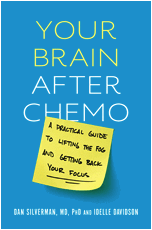Your Brain After Chemo
encontrar mi
Author: Daniel Silverman, MD, PhD & Idelle Davidson
Publisher: DaCapo Press, 2009
Price: $25.00 US
ISBN: 0738212598
OncoLinkRating:
Cognitive changes after cancer therapy, often called "chemo-brain", are a side effect that survivors have long talked about in support groups and on discussion boards. Unfortunately, when their concerns were relayed to their healthcare teams, they were often dismissed as unrelated or a figment of their imagination. Numerous research studies have confirmed what survivors already knew something is different. Enter Idelle Davidson, breast cancer survivor and journalist, and Dr. Dan Silverman, a physician with a particular interest in neurologic function. Through this book, you can learn about Idelle’s own experiences with chemo-brain and those of many other survivors, whose stories are shared in the book. You can have that "chemo-brain" conversation with Dr. Silverman, read about the imaging studies that detect actual changes in the brains of people who have had chemotherapy, the studies that demonstrate the changes and explore how long they last – all without being dismissed as over reacting.
My first thought, while reading all the study details, was how someone with concentration difficulties could get through this – and the authors do point that difficulty out. Never fear, you can skip through to the chapters that get you started on a plan to improving your brain function and take your time going through the research.
The book addresses many aspects of chemo-brain, including a discussion the role this potential side effect may play in the decision to receive chemotherapy or not- probably not a discussion heard in many oncology offices. The authors detail the signs and symptoms of chemo-brain, psychological issues, such as depression and anxiety, that can go hand in hand for some survivors, how a brain with chemo-brain functions differently and how hormones play a role.
Unfortunately, there has been little research into what helps improve brain function post cancer therapy. The book provides advice on lifestyle changes, medications and helpful tips, much of which is based on research in people with Alzheimer’s disease, dementia and other cognitive impairments. While these tips may not have been "proven" in chemo-brain, they are certainly a good place to start while researchers look for definitive answers. The authors provide a 9 step process to getting your brain back on track. Actually, the tips would be helpful for any person, with or without a cancer history. The book concludes with some nice resources, including some ongoing research that readers may be able to participate in.
For survivors dealing with cognitive changes, this book is an important addition to the library and can be a tool to getting on with life.

